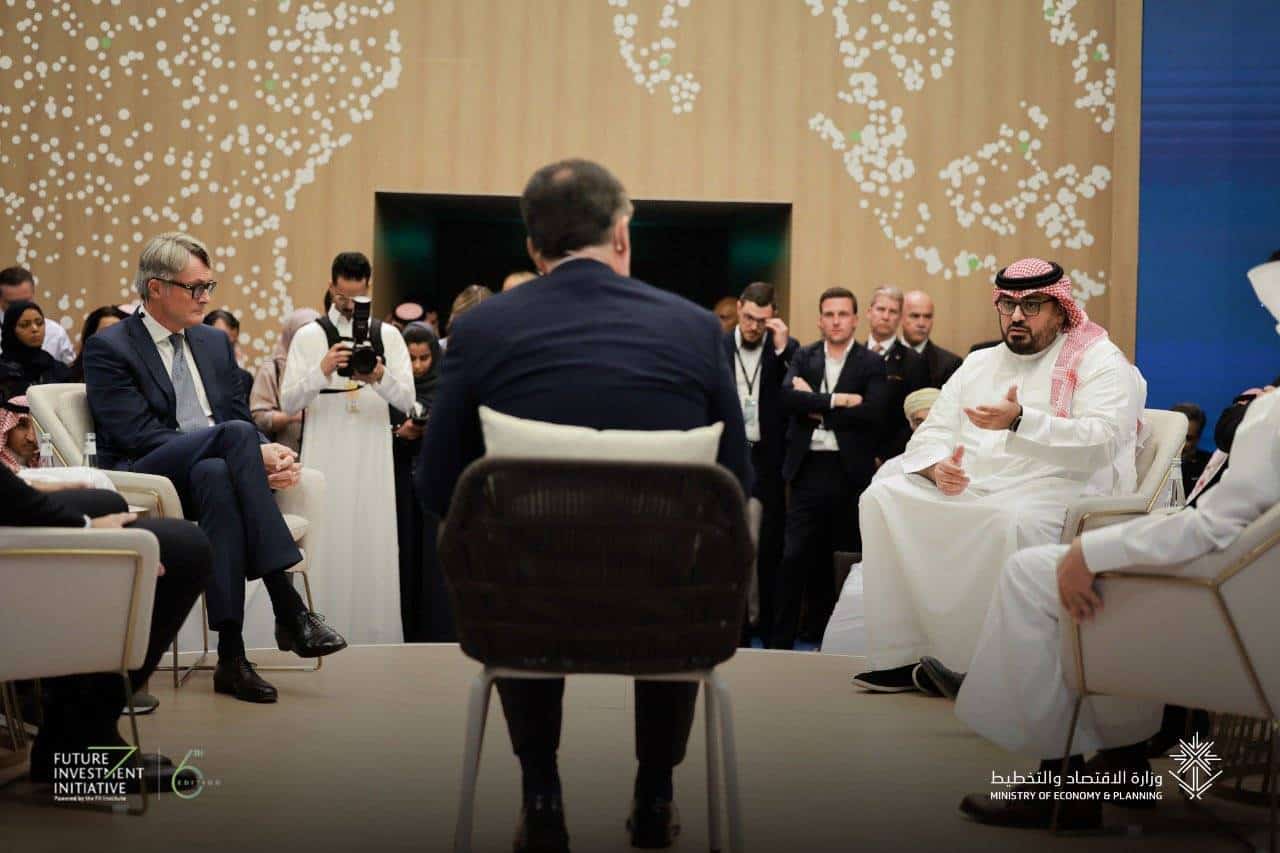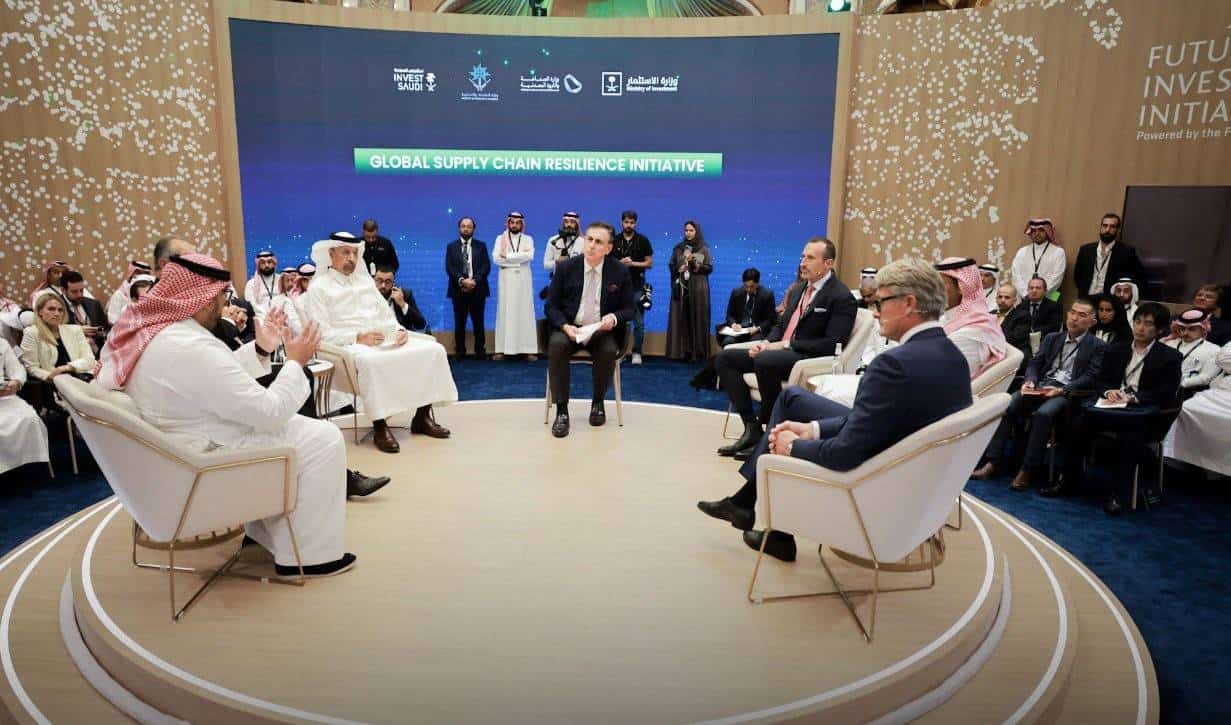Riyadh, Saudi Arabia — Emerging sectors are creating thousands of new jobs and driving long-term value for the Kingdom, said Saudi Minister of Economy and Planning Faisal bin Fadhil Alibrahim.
He was speaking at the sixth edition of the Future Investment Initiative (FII), held under the theme “Investing in Humanity: Enabling a New Global Order.” The three-day event – held at King Abdulaziz International Conference Center in Riyadh – concluded its activities late Thursday.

Alibrahim said Saudi Arabia’s Supply Chain Resilience Initiative – a multi-billion-dollar project to make the Kingdom a location of choice for leading global industrial companies, was launched last week by Saudi Crown Prince and Prime Minister Mohammed bin Salman bin Abdulaziz.
“FII presents an opportunity for the global community to convene, collaborate and make impactful decisions on the issues that matter most,” Alibrahim said.
“As the world confronts persistent supply chain disruption, we are focused on offering solutions that make global trade more predictable and reliable. The Supply Chain Resilience Initiative is a continuation of our economic diversification under Vision 2030, which has made our economy resistant to global supply chain shocks and an attractive business destination located at the heart of three continents.”
Also Read: Early preparations put GCC in better place to face tough economic conditions: Saudi finance minister
He also discussed how the Kingdom has promoted economic stability and diversification through strategic development initiatives during a panel titled ‘How Sovereign Wealth is Reordering the World’.
“Our challenge is diversifying our sources of growth. One good indicator in that direction is our non-oil GDP. Non-oil GDP in Saudi Arabia has growth at 6.1 percent in the last quarter. The highest in 11 years,” he said.
“Sovereign wealth funds are not only going to help developmentally but can help the world on many global issues, and many investment opportunities that are important, what PIF helps us do in this transitional period, is crowd-in the private sector, make more bold statements, and absorb the inefficiencies of new sectors,” he added.
Mining resources
Eng. Khalid bin Saleh Al-Mudaifer, Vice Minister of Industry and Mineral Resources for Mining Affairs, emphasized the significance of technology in surveying, prospecting, manufacturing, producing green hydrogen and green minerals, and reducing the environmental impact of carbon to keep up with the development of several sectors in the Kingdom of Saudi Arabia, including oil and gas.
During his participation in a dialogue session titled “Modern Mining” at the FII event, he highlighted the incentives of factories and stations to attract young generation to implement programs for them.
He noted that incentives worth $200 million have been spent in the previous years to stimulate digital transformation, renewable energy, and energy efficiency.
He stated that the Kingdom has a vision for minerals, clean energy, and fossil fuels, along with investments in new technology, with the goal of making the Kingdom a global hub for green energy and minerals.
Also Read: Gulf war couldn’t have been won without Kingdom’s support, says Saudi Energy Minister
He also pointed out the incentives and regulations provided to mining experts and discoverers, as well as the potential for up to 90 percent cost savings if materials are used and processed locally.
“The second edition of the International Mining Conference, which will be held in Riyadh in January of next year, will be a significant event during which we will discuss investments in the mining sectors,” he emphasized, adding that the Kingdom welcomes all investments in all mining sectors as well as investment systems in technology and infrastructure.
Culture and tourism
Saudi Cultural Development Fund CEO Mohammed bin Daiel, during a session, said modern content has been contributing to changing facets of culture and providing modern trends that have helped in opening new horizons and opportunities for cultural sectors like music, films, and others.
Qusai bin Abdullah AI-Fakhri, Chief Executive Officer (CEO) of the Tourism Development Fund, affirmed that the Kingdom is significantly growing its tourism industry and has enormous projects and promising investment opportunities, which have achieved record numbers by developing many projects.
On the third day of the FII activities, AI-Fakhri took part in a session titled “Leisure Industry Gets to Work,” in which a number of representatives from the tourist industry were also present.
The session’s speakers went through the scale of the market and the characteristics that distinguish the Kingdom of Saudi Arabia’s tourist industry, which has seen substantial recent growth.
Sabic’s strategy

Saudi Basic Industries Corporation (SABIC) Acting CEO, Eng. Abdulrahman bin Saleh Al-Fageeh, stated during a panel discussion on the investments needed over the next 50 years that the company’s business strategy is implemented over various time horizons.
Also Read: Aramco chief at FII6: World needs realistic, optimal energy transition plan
He noted that in the short term and with the aid of digital technologies, the company responds quickly to unforeseen price changes and supply chain disruptions.
In the long term, he continued, SABIC will change its governance framework to include responsibility into any firm that meets the organization’s sustainability objectives.
He stated that the company will continue to develop innovative technologies, expand its supply chain and logistical networks, and invest in human resources.
Digital currencies
Founders and executives of some of the leading digital currency companies reviewed the significance of digital currencies and their future.
Also Read: Growing ‘Davos in the Desert’ a sign of Saudi clout
The participants in a session titled “Building a Better Crypto Economy” talked about the methods and risks of using digital currencies, the speed and ease with which digital assets can be transferred, the opportunities for investment and governance, and the steps that can be taken to ensure the stability of the currency.
The success of digital currencies in commerce and electronic games, which supports the growth of the financial and economic sectors, was also mentioned by the participants.
Transformation through education
King Abdullah University of Science and Technology (KAUST) President Prof. Toni Chan asserted that the university provides research pieces with a global level to support the transformation that the Saudi Arabia is experiencing in a number of fields.
He pointed out that KAUST is regarded as a motivator for innovation and developing entrepreneurship and influence by providing facilities with a global level, internet protocols, and advanced technologies, in addition to investing in and accelerating emerging deep technology companies, communications, and other sectors.
Also Read: US officials not invited to Saudi investment forum: organiser
He also affirmed that the university’s mission is represented in the application of research through collaboration with the private sector, governmental agencies, and startup businesses to help the Kingdom of Saudi Arabia develop a sophisticated technological environment system and guarantee a sustainable future for all.
“We are especially proud of these sustainability-related projects that aim to address the biggest challenges in the Kingdom of Saudi Arabia and the rest of the world, as well as the opportunities in fields like smart health, artificial intelligence, food and water security, protecting marine life, and climate change,” he concluded.








